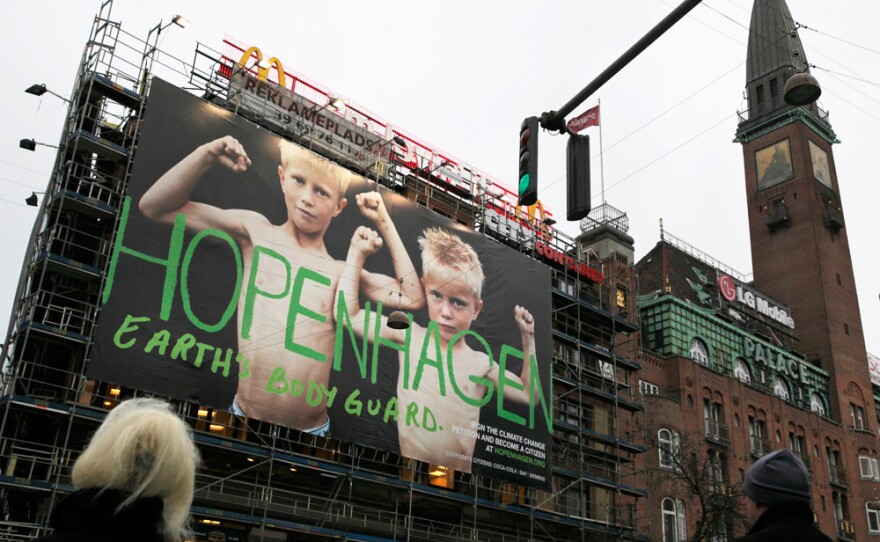There are so many issues on the table at the Copenhagen U.N. climate conference that politicians from all the major players have already declared there is no hope of reaching a binding legal agreement. But progress is still possible. Participants speak of reaching a "political agreement." Exactly what that would be remains undefined, but it would represent some form of commitment to address global warming that goes beyond mere rhetoric — yet falls short of a legally binding treaty.
The two-week formal negotiations with representatives from more than 190 nations started Monday, with the ultimate goal of setting up a mechanism to reduce global greenhouse gases. If the nations of the world don't limit carbon emissions, global temperatures could rise by 5 to 11 degrees Fahrenheit by the end of the century. Sea-level change is highly uncertain, but it could rise from 7 inches to as much as 6 feet.
More than 110 world leaders have said they plan to attend the conference — that's unprecedented for climate talks. The talks kick into high gear the second week, with President Obama flying in for the closing summit.
Potential Treaty Scenarios
Negotiators hope to agree at least to the shape of a future treaty, setting the stage for talks at a follow-up conference in 2010.
Possibilities include:
Targets And Timetables: In 1997, these same nations met in Kyoto, Japan, to negotiate a climate deal. In it, the rich nations of the world jointly negotiated targets for reducing emissions of carbon dioxide and five other greenhouse gases, under a certain timetable.
The rest of the world had no obligations. The Kyoto protocol is still in force, and contrary to what is often said about it, it does not expire in 2012. However, after that date, nations have no further emissions-reduction commitments. The United States signed the Kyoto pact, but the U.S. Senate never ratified it, so the U.S. is not party to this treaty.
That's one reason it's not very effective. Europe, the United States, Japan, Australia and Canada would just as soon drop the Kyoto Protocol and incorporate parts of it that they like into a new agreement. The developing world — which enjoyed having no obligations under this treaty — is fighting hard to keep that sweet deal. Killing Kyoto will be a hot topic in Copenhagen.
Kyoto Plus: One option in Copenhagen is to extend the Kyoto Protocol and to have a second, parallel agreement that would include the United States. (The United States has made it clear it won't join Kyoto, because it gives a free ride to China and other economic rivals.) The question, then, is what a legally binding deal that involves the U.S. would look like. In fact, the talks in Copenhagen are arranged in two parallel tracks: one dealing with the Kyoto Protocol, and a second called the Ad Hoc Working Group, which is trying to craft a parallel or replacement deal.
Pledge And Review: The United States favors an approach that marks a real departure from the Kyoto structure. Instead of jointly negotiating emissions-reduction targets and timetables for achieving them, the U.S. suggests that each nation bring to the table a pledge of what it intends to do to address climate change. For example, Obama has tentatively pledged to reduce U.S. greenhouse gas emissions by about 17 percent (relative to 2005 levels) by the year 2020. That's what the Waxman-Markey bill that passed the House aims to accomplish. Europe, meanwhile, seems prepared to reduce its emissions by 20 percent (relative to 1990 levels), which represents a deeper cut — or even 30 percent if other nations pledge to do enough.
Pledge And Review, DIY: China and other major developing countries have also stepped forward with pledges to control their emissions. These pledges are domestic plans that in some cases have legal force within the nations involved. But so far developing countries have steadfastly refused to make them legally binding in an international climate deal. The United States has made it abundantly clear that it will not accept a deal that's not legally binding internationally. This deadlock may not be resolved in Copenhagen, which means nations may leave without a clear idea of what shape a climate treaty would take.
Whatever form a treaty takes, nations will need to put something on the table to show they are serious about addressing climate change — from agreeing to emissions-reduction targets to funding clean energy efforts in poorer nations.
Emission Targets
Some countries have already put their numbers on the table and may not actually negotiate them in Copenhagen. For example, Obama has tentatively pledged to reduce U.S. greenhouse gas emissions by about 17 percent (relative to 2005 levels) by the year 2020. Europe, meanwhile, seems prepared to make a bigger cut, reducing its emissions by 20 percent (relative to 1990 levels).
China has a voluntary target to make its economy produce less carbon dioxide per unit of gross domestic product. That makes the economy more efficient, but because China's GDP is expected to grow rapidly, emissions will continue to grow under this scenario, and China is already the world's largest emitter. These emissions targets all fall far short of what scientists say is needed to stabilize the global atmosphere. They represent political and economic decisions. So expect to hear angry words about these goals, especially from the world's poorest and most vulnerable nations.
Money For Developing Countries
The World Bank projects that developing nations will need $400 billion per year to help them develop clean energy technologies rather than burning cheap coal, which is the source of a large part of carbon dioxide emissions. These nations would need another $150 billion per year to help them adapt to a planet that is already heating up. Developing nations are demanding that much money — or even more — from the rich nations of the world, which after all are responsible for most of the greenhouse gases now in the atmosphere. But that's far too much money for countries to pony up as foreign aid. So, questions on the Copenhagen table:
-- How much money will be available?
-- Where will money come from? One idea is to make carbon a commodity that can be traded on international markets, and to tax each trade to build a fund for the developing world. That's highly contentious and may violate a U.S. prohibition against international taxes.
-- Where will the money go? To the World Bank? The United Nations? Some new fund?
-- Who will get to spend it? Will it go to sometimes questionable governments in the developing world? To specific projects? Nongovernmental organizations?
Keeping The Treaty Honest
If the nations of the world can agree on a framework for a climate, they'll need a set of rules to measure and define success. There is a daunting list of unresolved issues in this area. How will carbon emissions be measured? Who will measure economic growth, which is factored into a number of national pledges? How will the wealthy nations verify that money they give to the developing world is being spent appropriately? How will nations verify that countries are complying with their stated targets? Will there be any consequence for nations that fail to reach their emissions targets? For example, will countries impose tariffs on goods from countries that aren't in compliance with a deal — sparking possible trade wars? Or will enforcement be simply to "name and shame" the nations that fall short?
Defining Success
Dutch diplomat Yvo de Boer, the United Nations official who is managing the talks, says short of a treaty, the conference will be a success in his view if delegates agree on the following:
-- The rich nations of the world should pledge to reduce their emissions by a reasonable amount and set a timeline for achieving those goals.
-- Rapidly industrializing nations, such as China and India, pledge to take measures to address climate change, even though those will likely fall short of actually reducing their overall emissions.
-- Developed nations put forth a substantial sum of money that can be distributed immediately to the world's poorest countries so they can start adapting to a changing climate.
-- Nations should start to figure out a long-term mechanism for providing larger amounts of financial support to developing nations so they can undertake climate-friendly activities such as restoring forests and developing clean sources of energy.
But like a lot of things surrounding this conference, there's no agreement on what success at Copenhagen will look like.
Copyright 2022 NPR. To see more, visit https://www.npr.org. 9(MDAzMjM2NDYzMDEyMzc1Njk5NjAxNzY3OQ001))







